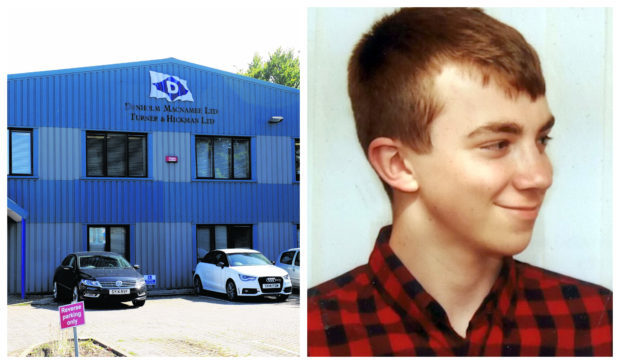A man accused of killing a teenage colleague by starting up an oil rig cable pulling machine while the lad was inside it today told a jury he was not present when the boy was injured – and “thought he was taking a breather” when he found him unconscious.
Dean Reynolds said that instead he had walked into a building at Denholm MacNamee’s industrial cleaning and painting facility in Inverurie, Aberdeenshire, and found Michael McLean, 17, lying on the floor.
Giving evidence in his own defence Reynolds – who is accused of the culpable homicide of Michael – told the High Court in Aberdeen he “thought he was taking a breather” and that the teenager wasn’t badly hurt.
The court heard Reynolds told police he didn’t think Michael – who was helping him prepare the cable spooling machine for painting – would have been able to reach the starting handle for the machine from inside the drum where he was found.
And he denied ever starting up the machine while Michael was inside it on August 14 2015, the last day of the teenager’s summer job at the firm before he was due to resume school.
The court later heard that less than two hours after the incident Reynolds had text his girlfriend telling her he was “s******g it”
The trial earlier heard how Michael was found unconscious and bleeding from the ears on the floor of a paint shed in which sat an industrial spooling machine used to raise and lower subsea cables from oil platforms and boats.
His father – who also worked at the firm – frantically tried to give him CPR before he was rushed to Aberdeen Royal Infirmary where he died six days later.
The court was told that a post-mortem examination found that Michael had suffered a broken vertebrae in his neck, which caused a tear in his spinal cord leading to cardiac arrest which starved his brain of oxygen.
Today Reynolds gave evidence in his own defence under questioning from his advocate, Iain Duguid QC.
Reynolds told the court he had gone into the “paint tent” – a building used for painting industrial items at the yard – around 12.20pm and found Michael lying in the spooling machine they had been working on .
Mr Duguid asked Reynolds how he felt in the moments after he made the discovery.
He said: “My mind was all over the place – I didn’t know what I had seen.
“I was shocked and scared.
“Everything was going so slow – my mind was going slow.”
Mr Duguid QC asked: “Did you think he was badly injured?”
Reynolds replied: “No – he just looked unconscious.”
Reynolds said he had gone for help and brought two colleagues to the tent.
Mr Duguid asked if Reynolds had ever told other works that it looked like “Michael was taking a breather” when he was found.
Reynolds replied: “I think so yes. It looked like that – like he was having a rest.”
Reynolds later told the court he had sent messages to his partner about the incident in which he said a “young lad” was “maybe dead” and that he was “s******g myself”.
Asked why he had written that Reynolds added: “Because I was scared of what I’d seen.”
Detective sergeant John Sneddon told the court he had twice interviewed Reynolds over the incident.
In a lengthy statement read to the court, DS Sneddon said Reynolds had told him: “He couldn’t reach the lever [to start the machine] from where he was. I’m not sure he would have been able to operate the lever from inside the drum.
“His dad, Mark, arrived and started doing CPR.
“I had to leave the tend as I felt I couldn’t do anything. I felt hopeless.”
Reynolds added in his statement that he had last used the spooler machine shortly after his morning tea-break on the day Michael was injured and “was not aware” of it being used by anyone else that day as he “would have heard it”.
Reynolds, 23, of Regent Street, Keith, Aberdeenshire, denies a charge of culpable homicide.
At the close of the Crown case today advocate depute Richard Goddard withdrew a charge of attempting to pervert the course of justice by discarding two pairs of work boots belonging to him to avoid examination and analysis of them.
He also deleted an alternative charge under the Health and Safety at Work Act 1974.
The trial, before judge Lord Beckett and a jury of six men and nine women, continues.
